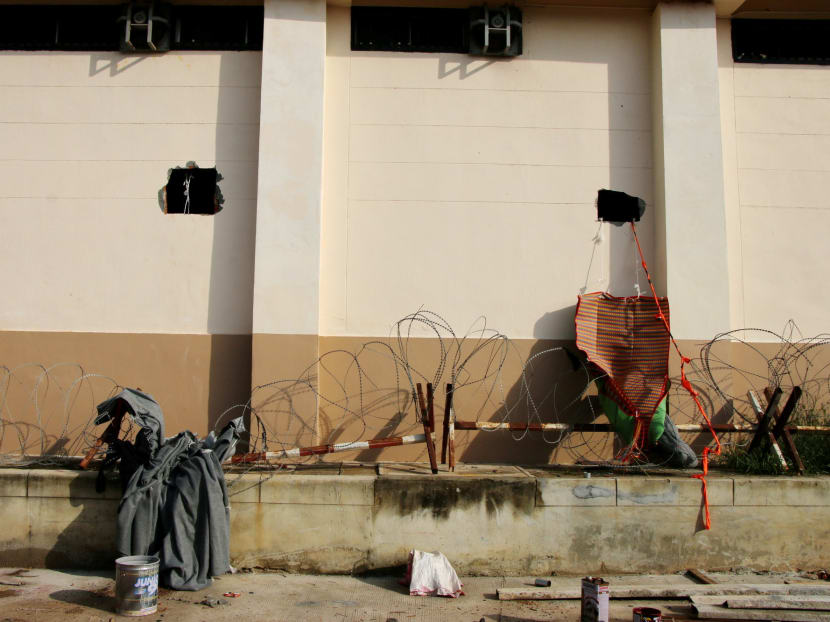Malaysian police steps up patrol at Malaysia-Thai border
KUALA LUMPUR — Malaysia has stepped up security along areas bordering neighbouring Thailand after scores of ethnic Uighur Muslims from China broke out of an immigration detention centre in southern Thailand.

Square holes in the wall of a detention centre are seen near the Thailand-Malaysia border. Malaysia has stepped up security along areas bordering neighbouring Thailand after scores of ethnic Uighur Muslims from China broke out of an immigration detention centre in southern Thailand. Photo: Dailynews/ via Reuters
KUALA LUMPUR — Malaysia has stepped up security along areas bordering neighbouring Thailand after scores of ethnic Uighur Muslims from China broke out of an immigration detention centre in southern Thailand.
Malaysia’s national police chief Mohamad Fuzi Harun said both the police and the army have increased patrols along the border areas of three Malaysian states — Kedah, Kelantan and Perak.
“We do no rule out the possibility of them trying to sneak into the country and we have taken precautions by stepping up our border patrols, especially along the (Thai) border,” national news agency Bernama quoted him as saying.
On Monday, some 20 Uighur Muslims bored through the wall of the centre in Sadao, near Thailand’s southern-most border, using blankets to climb out as heavy rains masked their flight.
Thailand’s Deputy Prime Minister Gen Prawit Wongsuwan said five of the 20 escapees had been recaptured, but he did not furnish further details on the matter.
“The rest have crossed the border (into Malaysia). So, now we are contacting our counterparts in Malaysia to send them back to us,” he said on Tuesday.
Six Thai immigration officers have been transferred pending an investigation into the breakout.
Malaysia's Deputy Prime Minister Ahmad Zahid Hamidi said on Wednesday (Nov 22) that Malaysia has received information on the escapees from Thai authorities.
“(We are not certain that the Uighurs are here) but if they are, we know how to get them,” he said, adding that this includes working closely with Aseanapol and the Interpol.
The escapees were among hundreds detained in Thailand 2014 despite their claims to be Turkish citizens.
Turkey shares ethnic links with the Uighurs and accepts those who flee from China’s western Xinjiang region, where the Muslim minority has faced increasingly strict curbs on their faith, including bans on beards and public prayers.
A spokesman for China’s Foreign Affairs Ministry has urged the Thai authorities to return the Uighurs.
“China has asked Thailand’s relevant departments to bring back these fugitives as soon as possible,” spokesman Lu Kang said at a press briefing on Tuesday.
In July 2015 Thailand forcibly deported 100 Uighurs, who were initially detained with the group of escapees, back to Chinese authorities.
The move was blasted by the United Nations and followed one month later by a deadly blast at a Bangkok shrine that killed ethnic Chinese tourists.
Two Uighur-origin men are facing trial for the bombing, sparking speculation the attack may have been in revenge for the forced deportation.
Uighurs often claim Turkish citizenship to avoid returning to China.
Thailand does not grant asylum to refugees but has said Uighurs can remain in Thai custody until their citizenship is established, with some 61 currently in detention across the country. AGENCIES






